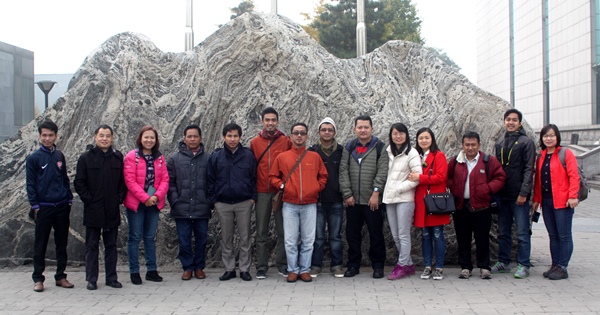International Cooperations
365体育官网入口_365全球最大赌博_365bet正网盘口
Reprinted from: http://www.ccop.or.th/

The Third Workshop/Training of the CCOP-CGS Project on Integrated Geophysical and Geochemical Data Processing (IGDP) was held on 12-14 November 2015 in Beijing, China hosted and funded by China Geological Survey (CGS) through its Development and Research Center (DRC), in cooperation with CCOP.
There were 27 participants in the workshop/training from CCOP Member Countries, Cambodia, China, Indonesia, Japan, and Malaysia including the staff of CCOP Technical Secretariat.
At the Opening Ceremony, Ms Marivic Pulvera Uzarraga, Manager, Programme Operation and Information of CCOP Technical Secretariat (CCOPTS), delivered the welcome address on behalf of the CCOPTS Director, Dr Adichat Surinkum, while Prof. Qi Yabin, Deputy Director
Development and Research Center, CGS officially opened the workshop. Mr Ma Yongzheng, Deputy Permanent Representative of China to CCOP, Division Director, Department of International Cooperation, Science & Technology, Ministry of Land and Resources, and Dr Shu Siqi, Acting Director of International Cooperation Division, Department of Science and Technology & International Cooperation, CGS, graced the Opening Ceremony with their presence.
Country presentations on national geophysical and geochemical works, as well as geological mapping and database activities were made by Cambodia, China, Indonesia, Japan and Malaysia.
Dr Zhang Minghua, IGDP Project Leader and Division Director, DRC, CGS introduced the IGDP Project by presenting the general concept of geophysical exploration, its methods and applications, gave an overview of the RGIS-IGDP software, its general function, geophysical/geochemical/geological databases, and gravity / magnetic / data processing application. He also presented application case studies using the software.
Chinese Experts from CGS ran the training session in the use of the IGDP Software, which were provided to all the participants of the training.
Dr Liu Rongmei, DRC, CGS presented on the update of OneGeologyChina. The 1 million scale geological map of China is now accessible from OneGeology Global Portal, http://portal.onegeology.org/OnegeologyGlobal/and China OneGeology Portal, http://onegeologychina.zy-grp.com:8081/. More information about OneGeologyChina can be obtained from this website, http://onegeologychina.zy-grp.com:8080/en/
There were 2 case studies presented by Resource Persons from China and Indonesia. Prof. Lu Qingtian, Deputy Director of the Institute of Geophysical and Geochemical Exploration, Chinese Academy of Geological Sciences (CAGS),presented on gravity and magnetic interpretation for mineral exploration in China.Mr Tony Rahadinata of the Geological Agency of Indonesia, presented on the integrated geological, geophysical, and geochemical (3G) data for geothermal prospecting at Kadidia area, Indonesia.
During the discussion, the following were the recommendations from the participants for the improvement of the software:
- add statistical analysis, correlation of geochemical elements, histogram.
- add 2D/3D MT inversion
- include interpretation functions, well-logging, seismic interpretation such as SMT kingdom
The member countries were also requested to send feedback before the end of the year about the IGDP project, answering the following questions:
- Have you used the RGIS-IGDP Software in your work? If yes, state the ways how you used it. If no, why? Do you have any plans in using it in one way or another?
- What are the impacts of IGDP Project in your country?
- What are your recommendations for the improvement of the software?
- Other demands/requests
Since this is the last activity for the first phase of the IGDP Project, discussion on the second phase of the project were also raised. The following are the prospective activities for the second phase:
- Compilation of 1:1M Geophysical/Geochemical Map of CCOP Member Countries or 1:1 M Database of Geology, geophysics, geochemistry, etc.,
- no seismi
- working together with CCOP OneGeology may be considered.
- Customized RGIS-IGDP Training for a CCOP Member Country using own data in site.
- Indonesia, Cambodia, PNG…
- Should point out contact person for further proposal and actions
All the participants received a package of the RGIS-IGDP Software as well as certificate of participation at the end of the workshop. Dr. Tan Yongjie, Chief Scientist, DRC, CGS,officially closed the workshop after thanking all the participants in their active partaking and the CCOP Technical Secretariat for the close collaboration in the organization of the workshop.




